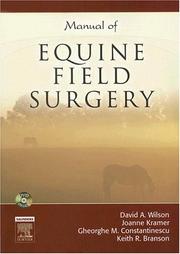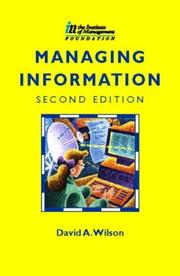| Listing 1 - 10 of 35 | << page >> |
Sort by
|
Book
ISBN: 9783662458341 3662458330 9783662458334 3662458349 Year: 2015 Publisher: Berlin, Heidelberg : Springer Berlin Heidelberg : Imprint: Springer,
Abstract | Keywords | Export | Availability | Bookmark
 Loading...
Loading...Choose an application
- Reference Manager
- EndNote
- RefWorks (Direct export to RefWorks)
This timely book describes and analyses a neglected area of the history of concern for animal welfare, discussing the ends and means of the capture, transport, housing and training of performing animals, as well as the role of pressure groups, politics, the press and vested interests. It examines primary source material of considerable interdisciplinary interest, and addresses the influence of scientific and veterinary opinion and the effectiveness of proposals for supervisory legislation, noting the current international status and characteristics of present-day practice within the commercial sector. Animal performance has a long history, and at the beginning of the twentieth century this aspect of popular entertainment became the subject not just of a major public controversy but also of prolonged British parliamentary attention to animal welfare. Following an assessment of the use of trained animals in the more distant historical past, the book charts the emergence of criticism and analyses the arguments and evidence used by the opponents and proponents in Britain from the early twentieth century to the present, noting comparable events in the United States and elsewhere.
Life Sciences. --- Fish & Wildlife Biology & Management. --- Ethics. --- Life sciences. --- Wildlife management. --- Sciences de la vie --- Morale --- Faune --- Aménagement --- Animal welfare. --- Human-animal relationships. --- Zoology --- Health & Biological Sciences --- Vertebrates --- Zoology - General --- Animal-human relationships --- Animal-man relationships --- Animals and humans --- Human beings and animals --- Man-animal relationships --- Relationships, Human-animal --- Abuse of animals --- Animal cruelty --- Animals --- Animals, Cruelty to --- Animals, Protection of --- Animals, Treatment of --- Cruelty to animals --- Humane treatment of animals --- Kindness to animals --- Mistreatment of animals --- Neglect of animals --- Prevention of cruelty to animals --- Protection of animals --- Treatment of animals --- Welfare, Animal --- Abuse of --- Wildlife. --- Fish. --- Social aspects --- Deontology --- Ethics, Primitive --- Ethology --- Moral philosophy --- Morality --- Morals --- Philosophy, Moral --- Science, Moral --- Philosophy --- Values --- Animal populations --- Game management --- Management, Game --- Management, Wildlife --- Plant populations --- Wildlife resources --- Natural resources --- Wildlife conservation --- Management --- Fish --- Pisces --- Aquatic animals --- Fisheries --- Fishing --- Ichthyology --- Animals. --- Animal kingdom --- Beasts --- Fauna --- Native animals --- Native fauna --- Wild animals --- Wildlife --- Organisms --- Human-animal relationships --- Fishes.

ISBN: 1416002707 9781416002703 9781437710380 1437710387 Year: 2006 Publisher: [Place of publication not identified] Saunders Elsevier
Abstract | Keywords | Export | Availability | Bookmark
 Loading...
Loading...Choose an application
- Reference Manager
- EndNote
- RefWorks (Direct export to RefWorks)
HORSES. --- Horses --- Veterinary surgery --- Veterinary surgery. --- Diseases --- Treatment --- Surgery --- Equidae --- Perissodactyla --- Mammals --- Vertebrates --- Chordata --- Animals --- Eukaryota --- Organisms --- Health & Biological Sciences --- Veterinary Medicine --- Equus caballus --- Equus przewalskii --- Horse, Domestic --- Domestic Horse --- Domestic Horses --- Horse --- Horses, Domestic --- Eucarya --- Eukarya --- Eukaryotes --- Eukaryotas --- Eukaryote --- Animalia --- Animal --- Metazoa --- Chordates --- Chordate --- Vertebrate --- Mammalia --- Mammal --- Perissodactylas --- Ass --- Equus asinus --- Asses --- Donkeys --- Mules --- Zebras --- Donkey --- Mule --- Zebra --- Farriery --- Veterinary medicine --- Hippology --- Domestic animals --- Equus --- Livestock --- Pachyderms --- Hinnies --- surgery
Book
ISBN: 1437714498 1416099794 1336233486 9781437714494 9781416099796 Year: 2012 Publisher: Saint Louis, Mo. : Elsevier Saunders,
Abstract | Keywords | Export | Availability | Bookmark
 Loading...
Loading...Choose an application
- Reference Manager
- EndNote
- RefWorks (Direct export to RefWorks)
No other equine quick reference comes close to providing this much accurate, timely, and clinically useful diagnostic and therapeutic information. Clinical Veterinary Advisor: The Horse is six books in one -- Diseases and Disorders, Procedures and Techniques, Differential Diagnosis, Laboratory Tests, Clinical Algorithms, and a Drug Formulary. Plus, a companion website gives you convenient, searchable access to the full text and other useful tools. Covering hundreds of current topics in a concise at-a-glance format, this authoritative resource from David A. Wilson
Horses --- Veterinary medicine. --- Diseases. --- Farriery --- Large animal medicine --- Large animal veterinary medicine --- Livestock medicine --- Veterinary science --- Medicine --- Animal health --- Animals --- Domestic animals --- Livestock --- Diseases --- Losses
Book
ISBN: 0773586180 9780773586185 0773586458 Year: 2011 Publisher: Montréal [Que.] McGill-Queen's University Press
Abstract | Keywords | Export | Availability | Bookmark
 Loading...
Loading...Choose an application
- Reference Manager
- EndNote
- RefWorks (Direct export to RefWorks)
After a tumultuous career as a revolutionary in Ireland and an ultra-conservative Catholic in the United States, Thomas D'Arcy McGee moved to Canada in 1857, where he became a force for moderation and the leading Irish Canadian politician in the country. Determined that Canada should avoid the ethno-religious strife that afflicted Ireland, he articulated an inclusive, broad-minded nationalism based on generosity of spirit, a willingness to compromise, and a reasonable balance between order and liberty. To realize his vision, McGee became a strong supporter of the "new northern nationality." A spellbinding orator who emerged as the youngest and most intellectually gifted of the Fathers of Confederation, he fought what he saw as the atavistic and intolerant elements of Canadian life - the Orange Order, with its strident anti-Catholicism; the opponents of separate schools, whom he viewed as enemies of minority rights; and above all the Fenian Brotherhood, with its dreams of revolutionizing Ireland and annexing Canada to the United States. Convinced that compromise with Fenianism was impossible, he set out to destroy the movement through a strategy of confrontation and polarization - channeling his earlier extreme tendencies in the service of moderation and attempting to reduce the influence of Fenianism within his own community. In the process, he alienated many of his former supporters, who came to regard him as a traitor who sacrificed the cause of Irish nationalism on the altar of personal ambition. On 7 April 1868, McGee was assassinated on the doorstep of his Ottawa boarding house. As someone who took an uncompromising stand against militants within his own ethno-religious community, and who attempted to balance core values with minority rights, McGee has become increasingly relevant in today's complex multicultural society.
Politicians --- McGee, Thomas D'Arcy, --- MacGee, Thomas d'Arcy --- M'Gee, Thomas d'Arcy --- D'Arcy McGee --- M'Gee, Thomas Darcy --- McGee, Thomas d'Arcy --- Darcy McGee, Thomas --- Canada --- Politics and government --- History

ISBN: 1501711598 9781501711596 0801431751 9780801431753 080147759X Year: 2011 Publisher: Ithaca, NY : Cornell University Press,
Abstract | Keywords | Export | Availability | Bookmark
 Loading...
Loading...Choose an application
- Reference Manager
- EndNote
- RefWorks (Direct export to RefWorks)
Among the thousands of political refugees who flooded into the United States during the late-eighteenth and early-nineteenth centuries, none had a greater impact on the early republic than the United Irishmen. They were, according to one Federalist, "the most God-provoking Democrats on this side of Hell." "Every United Irishman," insisted another, "ought to be hunted from the country, as much as a wolf or a tyger." David A. Wilson's lively book is the first to focus specifically on the experiences, attitudes, and ideas of the United Irishmen in the United States. Wilson argues that America served a powerful symbolic and psychological function for the United Irishmen as a place of wish-fulfillment, where the broken dreams of the failed Irish revolution could be realized. The United Irishmen established themselves on the radical wing of the Republican Party, and contributed to Jefferson's "second American Revolution" of 1800; John Adams counted them among the "foreigners and degraded characters" whom he blamed for his defeat. After Jefferson's victory, the United Irishmen set out to destroy the Federalists and democratize the Republicans. Some of them believed that their work was preparing the way for the millennium in America. Convinced that the example of America could ultimately inspire the movement for a democratic republic back home, they never lost sight of the struggle for Irish independence. It was the United Irishmen, writes Wilson, who originated the persistent and powerful tradition of Irish-American nationalism.
Radicalism --- Irish Americans --- Extremism, Political --- Ideological extremism --- Political extremism --- Political science --- Ethnology --- Irish --- History --- Politics and government. --- United Irishmen. --- United Irish Society --- Society of United Irishmen --- United Irishmen of Dublin --- Society of United Irishmen of Dublin --- Ireland --- United States --- Politics and government
Book
Year: 1967 Publisher: Ithaca (N.Y.) : Cornell university press,
Abstract | Keywords | Export | Availability | Bookmark
 Loading...
Loading...Choose an application
- Reference Manager
- EndNote
- RefWorks (Direct export to RefWorks)
Book
Year: 1970 Publisher: New York (N.Y.) : Praeger,
Abstract | Keywords | Export | Availability | Bookmark
 Loading...
Loading...Choose an application
- Reference Manager
- EndNote
- RefWorks (Direct export to RefWorks)

ISBN: 0750633891 Year: 1997 Publisher: Oxford Butterworth-Heinemann
Abstract | Keywords | Export | Availability | Bookmark
 Loading...
Loading...Choose an application
- Reference Manager
- EndNote
- RefWorks (Direct export to RefWorks)
Digital
ISBN: 9783662458341 9783662458334 9783662458358 9783662509319 Year: 2015 Publisher: Berlin, Heidelberg Springer
Abstract | Keywords | Export | Availability | Bookmark
 Loading...
Loading...Choose an application
- Reference Manager
- EndNote
- RefWorks (Direct export to RefWorks)
This timely book describes and analyses a neglected area of the history of concern for animal welfare, discussing the ends and means of the capture, transport, housing and training of performing animals, as well as the role of pressure groups, politics, the press and vested interests. It examines primary source material of considerable interdisciplinary interest, and addresses the influence of scientific and veterinary opinion and the effectiveness of proposals for supervisory legislation, noting the current international status and characteristics of present-day practice within the commercial sector. Animal performance has a long history, and at the beginning of the twentieth century this aspect of popular entertainment became the subject not just of a major public controversy but also of prolonged British parliamentary attention to animal welfare. Following an assessment of the use of trained animals in the more distant historical past, the book charts the emergence of criticism and analyses the arguments and evidence used by the opponents and proponents in Britain from the early twentieth century to the present, noting comparable events in the United States and elsewhere.
General ethics --- Nature protection --- Fauna. Zoological determination guides --- Fishes --- natuurbeheer --- ethiek --- dieren --- vissen (biologie)

ISBN: 9781437710380 1437710387 1416002707 9781416002703 Year: 2006 Publisher: St. Louis, Mo Saunders
Abstract | Keywords | Export | Availability | Bookmark
 Loading...
Loading...Choose an application
- Reference Manager
- EndNote
- RefWorks (Direct export to RefWorks)
Mammals --- Veterinary pathology --- Veterinary surgery --- Veterinary medicine
| Listing 1 - 10 of 35 | << page >> |
Sort by
|

 Search
Search Feedback
Feedback About UniCat
About UniCat  Help
Help News
News